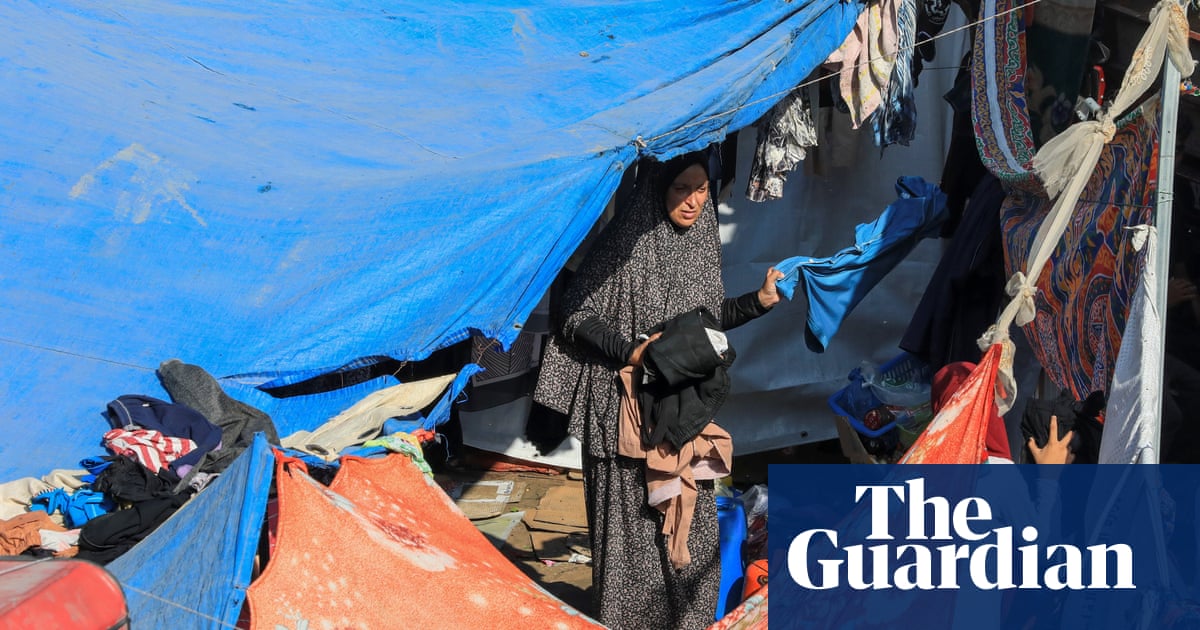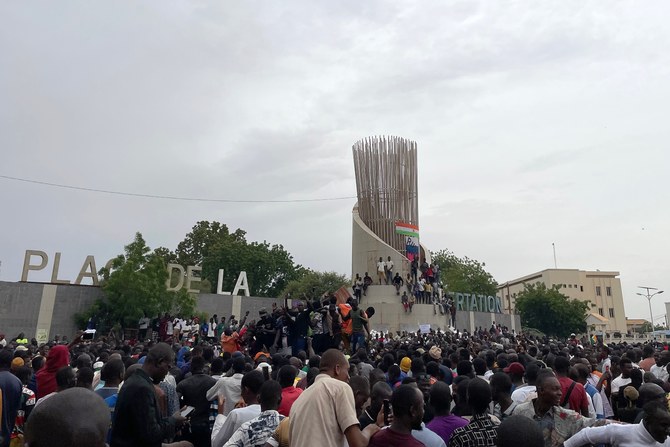
Doctors and medics forced to care for the sick, the elderly and the wounded who cannot flee the war zone
Situation in besieged city of Mariupol particularly dire; neither can aid enter it nor civilians flee for safety
JEDDAH: Almost overnight, the war in Ukraine has compelled doctors and medics to become almost superhuman, forced to care for the sick, the elderly and the wounded who are in no position to flee the war-torn country, as health facilities come under air and artillery attack.
Since the start of Russia’s invasion of Ukraine on Feb. 24, some 43 assaults on health facilities have been documented by the World Health Organization’s Surveillance System for Attacks on Health Care.
In 24 of the reported attacks, health facilities were either damaged or completely destroyed, while in five cases ambulances were hit. A total of 12 people were killed and 34 injured in these attacks, but aid agencies fear the nationwide toll is far higher.
“WHO strongly condemns acts of violence against health care,” the UN agency said in a statement on March 14. “Every single attack deprives people of life-saving services. Attacks on health care are violations of international humanitarian law and human rights.”
Disruption to trade and distribution has meant that oxygen, insulin, surgical supplies, anesthetics, transfusion kits and other medical supplies, including those for the management of pregnancy complications, are already running dangerously low across Ukraine.
“Supply chains have been severely disrupted,” the WHO said. “Many distributors are not operational, some stockpiles are inaccessible due to military operations, medical supplies are running low, and hospitals are struggling to provide care to the sick and wounded.”
The deterioration of health infrastructure has also led to mounting concerns about hypothermia, frostbite and respiratory diseases in the extreme cold. Alarm bells are also ringing for mental health issues, and a lack of treatment for chronic conditions such as cardiovascular disease, diabetes and cancers.
“Faced with this grim and escalating crisis, we are mobilizing a massive relief effort,” said the UN’s humanitarian chief, Martin Griffiths, as an allocated fund of $40 million from the Central Emergency Response was announced on March 14 to help aid agencies.
And because of active fighting in the north, east and south of the country, many community health workers have been forced to flee or go into hiding, leaving elderly people and those with mobility issues fending for themselves.
The scene is, unfortunately, all too familiar. Burning buildings, people packed in bomb shelters for safety, the injured carried off by paramedics, and the deceased covered by pieces of cardboard waiting to be transferred to a morgue to be identified by their next of kin.
In a joint statement issued on March 13, the WHO, the UN Children’s Fund and the UN Population Fund called for an immediate ceasefire and an end to attacks on healthcare professionals and facilities in Ukraine.
“To attack the most vulnerable — babies, children, pregnant women and those already suffering from illness and disease, and health workers risking their own lives to save lives — is an act of unconscionable cruelty,” they said.
Possibly the most shocking images to emerge from Ukraine in recent days were those depicting the appalling aftermath of a missile strike on a maternity hospital in the besieged southern port city of Mariupol on March 9.
At least three people were killed in the attack, including a young girl, while another pregnant woman wounded in the attack died along with her baby on March 14. Photographs of the women being stretchered out of the ruins have become emblematic of the war’s brutal toll on civilians.
According to UNFPA, the UN’s reproductive health agency, two other Ukrainian maternity hospitals had already been attacked and destroyed before that strike.
Nestled on the outskirts of Kyiv, Leleka Maternity Hospital provides the best birthing experience to expectant mothers. Today, the maternity hospital is a general hospital treating wounded soldiers while providing urgent obstetric care.
More than 20 babies have been born at the hospital since Feb. 24. Nearby villagers fleeing the shelling could take up to four hours to reach the hospital, once easily accessible by a highway. Now, people must take country roads to get shelter.
“It’s really hard to understand what’s going on in Kyiv now. And also, in our hospitals that was considered one of the best and most hospitals in Ukraine. Personally, I have never imagined this could be a reality in Europe. Such pictures I’ve seen only in the movies before,” said Vadim Zukin, COO of Lela Maternity Hospital.
Patients at the National Children’s Hospital Ohmatdyt, the largest children’s hospital in Ukraine, located near central Kyiv, woke up today to rocket attacks and fragments found near the hospital.
The hospital has also opened its doors to treat all war-affected patients. New York Times photographer Juan Diego Arredondo was transported to Ohmatdyt for treatment while his colleague Brent Reno was announced dead at the scene.
Anastasia Magerramova, press secretary for Ohmatdyt, shared images and videos inside the hospital walls showing wards filled with shellshocked patients recovering. Doctors and hospital staff have moved some patients underground while the most vulnerable have at least one attending doctor and nurse by their side.
Russian officials claim the maternity hospital had been taken over by Ukrainian extremists to use as a base and that no patients or medics were left inside. Russia’s ambassador to the UN and the Russian Embassy in London also claimed images of the attack’s aftermath were fakes.
Moscow says its “special military operation” in Ukraine is aimed at protecting Russia’s security and that of Russian-speaking people in the eastern Donbass region. Western nations have accused Russia of invading a sovereign country and of committing war crimes.
“Attacks on health care and health workers directly impact people’s ability to access essential health services — especially women, children and other vulnerable groups,” the UN agencies said in their joint statement.
“We have already seen that the health care needs of pregnant women, new mothers, younger children and older people inside Ukraine are rising, while access to services is being severely limited by the violence.”
More than 4,300 births have occurred in Ukraine since the start of Russian invasion “and 80,000 Ukrainian women are expected to give birth in the next three months,” the UN officials added.
“The health care system in Ukraine is clearly under significant strain, and its collapse would be a catastrophe. Every effort must be made to prevent this from happening.
“We call for an immediate ceasefire, which includes unhindered access so that people in need can access humanitarian assistance. A peaceful resolution to end the war in Ukraine is possible.”
The humanitarian situation in Mariupol is particularly dire, as aid cannot enter and civilians cannot flee to safety after repeated failures to establish evacuation corridors. Access to food and clean drinking water is a particular health concern.
“For small children this can be particularly dangerous,” Kate White, an emergency manager for Doctors Without Borders, said in a statement on March 11.
“Unlike adults, their bodies cannot withstand wide fluctuations in food and water intake, and so they are at high risk of dehydration. Contaminated water can also cause diarrhea, which in turn can set in motion a vicious circle, with diarrhea leading to further dehydration. In extreme situations, this can also result in death.”
Some 18 million people in Ukraine are believed to have been affected by the war, with 6.7 million internally displaced.
More than 2.8 million crossed into neighboring countries in the first two weeks of the invasion — the majority heading west into Poland — resulting in the fastest growing refugee crisis in Europe since the Second World War.
Ukrainian men between 18 and 60 are prohibited from leaving the country, which means those crossing into neighboring countries are predominantly women, children, older people and those living with disabilities, according to the International Committee of the Red Cross.
While aid agencies work to evacuate civilians trapped in the conflict zone, deliver medical supplies and provide sanitary accommodation for displaced households, the invisible scars caused by the trauma of war will be harder to address.
“Very often, mental health consequences take years to manifest but also require immediate assistance,” said White. “We will have to deal with the mental health impact of this war on a massive scale for years.”












